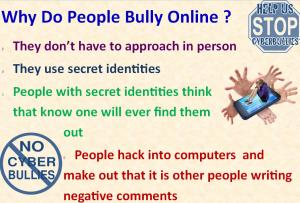Cyber Bullying & Schools
Why do people bully online?
 Sometimes people choose to embarrass, upset, pick on or intimidate other people using the internet or a mobile phone because it feels safer this way. Sending a nasty message or text can be done quickly and it means the person doing the bullying can’t see how much it hurts the other person. They might feel more distant from what they’re doing.
Sometimes people choose to embarrass, upset, pick on or intimidate other people using the internet or a mobile phone because it feels safer this way. Sending a nasty message or text can be done quickly and it means the person doing the bullying can’t see how much it hurts the other person. They might feel more distant from what they’re doing.
Effects of Cyberbullying:
Cyber bullying affects people from any age or walk of life, including children, teens and adults who all feel very distressed and alone when being bullied online. Cyber bullying can make you feel totally overwhelmed which can result in many feeling embarrassed that they are going through such a devastating time, and not knowing what support is available to them. Many children feel unable to confide in an adult because they feel ashamed and wonder whether they will be judged, told to ignore it or close their account which they might not want to do.
Signs to look out for:
- Low self-esteem
-
Withdrawal from family and spending a lot of time alone
-
Reluctance to let parents or other family members anywhere near their mobiles, laptops etc
- Finding excuses to stay away from school or work including school refusal
- Friends disappearing or being excluded from social events
- Losing weight or changing appearance to try and fit in
- Fresh marks on the skin that could indicate self-harm and dressing differently such as wearing long sleeved clothes in the summer to hide any marks
- A change in personality i.e. anger, depression, crying, withdrawn
Recent statistics show that:
- 20% of children and young people indicate fear of cyber bullies made them reluctant to go to school
- 5% reported self-harm
- 3% reported an attempt of suicide as a direct result of cyber bullying
- Young people are found to be twice as likely to be bullied on FB as any other social networking site.
- 28% of young people have reported incidents of cyber bullying on Twitter
- 26% of young people have reported incidents of cyber bullying on Ask.fm
What to do if you’re being bullied on a social network:
Most of the apps and social networking sites are for people aged 13 and over. They also state that bullying, abusive behaviours which includes harassment, impersonation and identity theft are banned and not allowed. However, results from our national bullying survey, shows 91% of people who reported cyber bullying said that no action was taken. This can leave users feeling disbelieved, vulnerable and knock their self-esteem.
A general rule when making a complaint about being bullied online is to copy the terms and conditions which have been breached and take a screenshot of the comment or photo as evidence. This may prompt any of these sites and apps to take action as you have shown them their obligation to investigate and take appropriate action.
